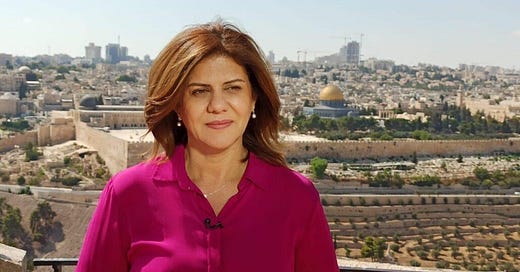Investigate Israel's killing of Shirine Abu Aqleh.
In the Middle East, it's all too normal for journalists to be targeted with impunity.
It’s hard to exaggerate the shock and outrage which erupted at yesterday’s shocking news that al-Jazeera journalist Shirine Abu Aqleh had been shot by an Israeli sniper while covering an Israeli raid in Jenin. My social media feed quickly filled up with Arab friends and colleagues from across the Middle East and North Africa expressing their sorrow.
The outrage grew as details emerged from eyewitnesses. The Palestinian-American journalist had been covering Palestinian news for decades; she was well known to Israeli security forces and was clearly identified as press. A legion of online sleuths, along with the Israeli NGO B’Tselem, showed that Abu Aqleh couldn’t have been struck by Palestinian gunfire, as claimed by the Israeli government (which quickly backed down from that claim). Ali Samudi, another journalist shot at the same time, told the Washington Post: “There were no fighters where we were, none at all. We don’t put ourselves in the line of fire. Whatever the Israeli army says for us to do, we do. They shot at us directly and deliberately.”
If you don’t follow the Arab media, you might not immediately grasp why this killing is one of those cases which breaks through that numbness. Shirine Abu Aqleh wasn’t a household name in the United States, didn’t work for the Washington Post. But she was an iconic figure for most of the Arab world. I first enountered her when working on Voices of the New Arab Public, my book about al-Jazeera and the transformational effects of satellite television and the internet. Back in the early 2000s, al-Jazeera didn’t just dominate the Arab media landscape, it defined it. The way it covered the second Intifada galvanized Arab public opinion, and ever since it has made Palestine central to the neo-Arabist identity narrative it crafted through its talk shows and news reporting. Abu Aqleh was one of the most prominent faces of that coverage.
Al-Jazeera isn’t the single dominant media platform it used to be. It got caught up in the polarization after the Arab uprisings, seen more as aligned with Qatar’s proxies and interests than as the home of a shared Arab public sphere. On many issues, al-Jazeera has receded to being just one of many partisan media outlets. But when there’s a crisis in Palestine, my sense is that many Arab viewers still turn first to al-Jazeera. And Abu Aqleh is who they saw reporting from the scene. That’s why her death hit so hard for so many people who had grown up watching her reporting. It’s symbolic of the continuing centrality of the Palestinian question to Arab political identity and commitments despite all efforts to shunt it to the side.
Sadly, it seems unlikely that the outrage and sorrow over her killing will lead to any real accountability. Israel has rejected calls for an independent investigation, instead insisting on its own internal investigation; the results seem predictable. The US is unlikely to put any real pressure for accountability even though she was an American citizen. And then, more journalists will die, the occupation will continue to take its steady toll on Palestinian lives.
This goes beyond journalism, beyond media freedoms, and beyond Israel/Palestine. It’s symbolic of the lack of accountability for state violence which lies at the heart of the region’s political morass - whether it’s the killing of famous journalists or the routine abuse of ordinary citizens, Egypt’s political prisons or Turkey’s decimation of academia and civil society, Bahrain’s sectarian repression or Syria’s brutality over a decade of war.
Israel’s killing of a journalist on the job is appallingly typical of the broader Middle East. The Committee to Protect Journalists documented no less than 190 journalists killed in Iraq alone since 1992, and 139 in Syria. According to the CPJ, 44% of the journalists killed globally over the last decade have been in the Middle East — 245 documented cases. Al-Jazeera alone has lost a dozen journalists.
Only a few of those killings have attracted global attention. Four years ago, a UN Commission of Inquiry was formed to investigate after Israeli snipers killed two Palestinian journalists in Gaza. It’s hard to forget Tarek Ayoub, killed by the US during the invasion of Iraq in 2003, or Marie Colvin, targeted by the Syrian regime in the early days of that war. Israel destroying the AP office building in Gaza captured attention. Nobody will every forget how the Saudis murdered Jamal Khashoggi. But those are the exceptions. And nobody faced serious consequences even then.
Maybe we’re just numbed by the relentless assaults on journalists and media freedoms by these repressive regimes — a category which very much includes Israel’s occupation of the West Bank. Maybe it’s resignation after seeing Mohammad bin Salman escaping any serious consequences for Khashoggi’s murder, perhaps the most iconic symbol of this impunity. It would be shocking if there were any more accountability for Abu Aqleh’s killing. But there should be. There should be an independent international investigation to pursue justice - here, and for so many other cases across the region.





Rachel Corrie lives on in our hearts, so will Shirine. Is there another country that gets away with killing United States women without so much as a blip from SecState?